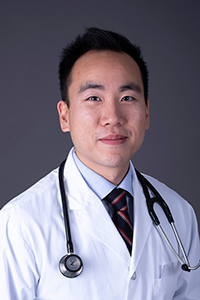
Dr Dan Le understands the value of engagement. As a Medical Oncologist at BC Cancer in Surrey, also currently serving in the roles of Managing Director for the BC Cancer Medical Staff Engagement Society and for the BC Cancer Medical and Dental Staff Association, he’s seen its benefits firsthand.
This is why as a Health System Redesign Project Lead for fiscal 2021/2022, Dr Le led the “Engaging physicians to transform cancer care delivery initiative” (EPTTCC), to engage with as many physicians as possible around their potential solutions to improve cancer care in the next five to 10 years.
Current challenges in cancer care
Having worked in various roles in cancer care around BC for the last 10 years, Dr Le appreciates that there are many opportunities for improvement. He notes that challenges in oncology are multi-factorial, including the evolving complexity of care, increasing patient volumes, and limited resources. The challenges have been further exasperated by the pandemic, staffing challenges, and an aging population. This reality is leading to moral distress among many physicians, including those practicing oncology.
While Dr Le knew that physicians at BC Cancer wanted to be involved in finding solutions to some of these challenges, he notes that BC Cancer is a very complicated environment with six cancer centres across the province, employing many different types of physicians. The impetus for the EPTTCC was the insight that it can be difficult to hear from a collective voice of physicians and articulate it in a way that’s helpful for leadership and administration and can be easily fed into the current processes.
An opportunity to move from challenges to solutions
The EPTTCC project was selected by the PHSA Health System Redesign program and received funding through the Specialist Services Committee, which is one of the Joint Collaborative Committees (JCC) of Doctors of BC and the Ministry of Health, along with the Shared Care Committee (SCC), the General Practice Services Committees (GPSC) and the Joint Standing Committee on Rural Issues (JSC). The purpose of the Health System Redesign funding is to compensate physicians for their participation in short-term, project-based, system redesign work within a health authority or community with health authority involvement.
Earlier this year, Dr Le’s team engaged with 71 physicians within radiation and medical oncology departments from across all six BC Cancer regional centres. “Doctors of BC, Facilities Engagement, and the SSC has always been so good at providing lots of opportunities for physicians to engage with each other and between physicians and leadership. I’ve been grateful to these groups for enabling the work that we do,” said Dr Le.
One of the key objectives for EPTTCC, in addition to engaging with BC Cancer physicians, was to shift to solutions-driven conversations on what they think would be beneficial for patients at both a provincial and center level.
From the resulting EPTTCC report, four priorities were identified, and the report was shared with the BC Cancer Executive, regional centre dyads, the MDSA, and other stakeholders involved in BC Cancer planning. The first three priorities spoke to an improved model of care with increased emphasis on multidisciplinary, team-based care. The fourth priority focused on physician workload, as well as metrics.
The EPTTCC is already having an impact on cancer care. “The nice thing about consolidating all of this input into a report that communicates the findings in a concise and easily understandable way is that it can now be fed into current planning processes,” said Dr Le.
Next steps for the EPTTCC
As a next step for the project, early next year Dr Le’s team will be reviewing the recommendations with all the specialities within BC Cancer that have not yet had a chance to fully engage with the project to further develop the report.
“I really appreciated the funding opportunity from SSC and through the Health System Redesign Funds from PHSA that enabled this. I appreciate how there are always opportunities every year to participate in these projects,” said Dr Le. “The engagement needs of physicians and administration changes often, depending on the needs of the patient population and where we are as a health care system. Whenever those issues come up and we need to respond and engage quickly, I’m encouraged that there are always funding opportunities that we can tap into.”
“Just go for it”
Dr Le’s advice to other physicians interested in getting involved in engagement projects is to “just go for it” and apply for the funds. He believes that now is an optimal time for physicians to get involved with engagement projects, as leadership is incredibly receptive to this type of work and in engaging with physicians at all levels.



